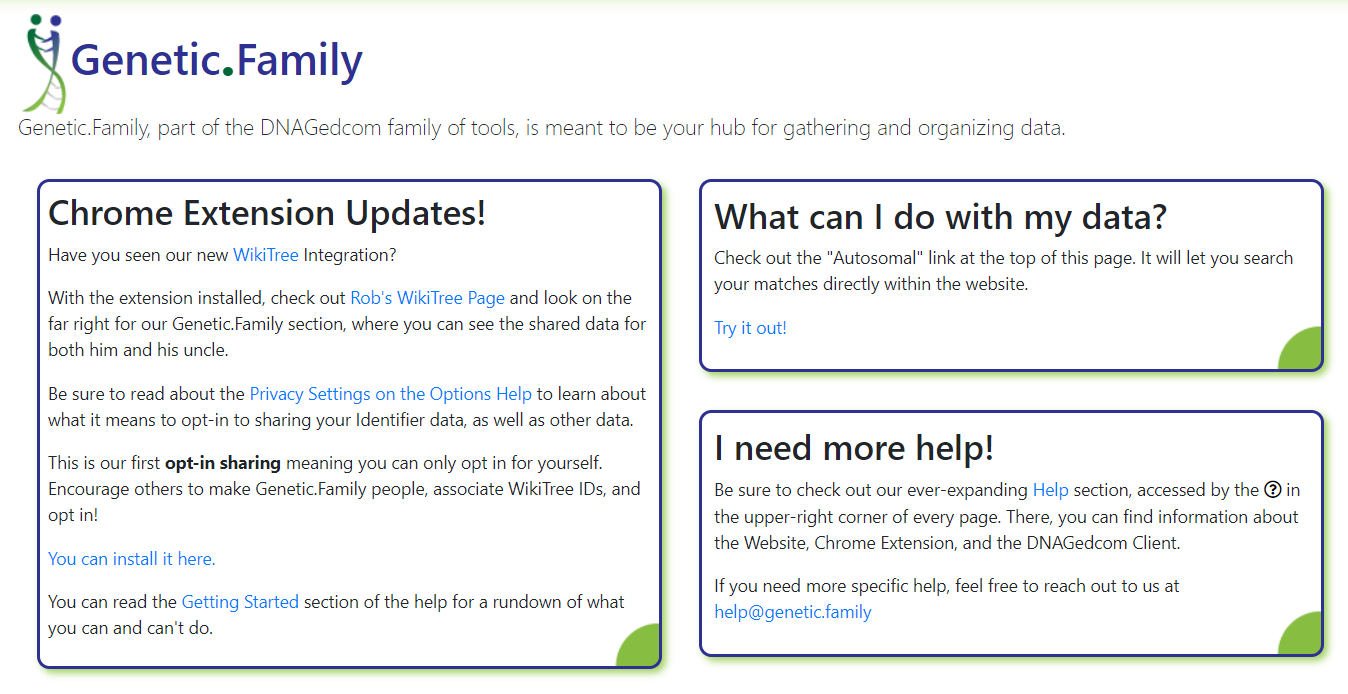New tools for DNA cousin matching
or how to deal with all those cousin matches




Do I really have 400/800 4th or closer cousins?




Maybe!



You will not match all your 3rd cousins
but you will match all your 2nd cousins
and closer relatives
What percentage of your cousins will match your DNA?

Simplified version of the relationship chart from the ISOGG wiki (courtesy Dimario, Wikimedia Commons)

The "G" trick
The cousin level = the number of "G"s , else the greats plus one
If you are in different generations take the shorter path and the other is removed by the generation difference

The matches called 2nd cousin at Ancestry share 200-600? cM but can easily be other relations, most of mine are 1st once and twice removed
I indicate the actual relationship first thing in the little notepad

Cindy is actually the daughter of my first cousin who shares 1100 cM, so not surprising to share so much
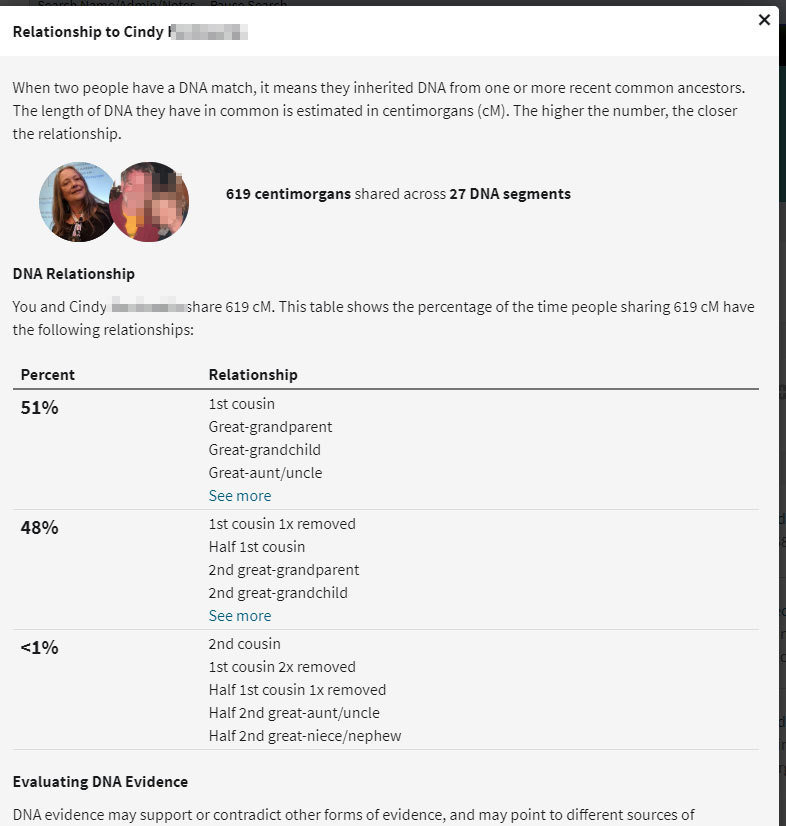

There is an online calculator at
https://dnapainter.com/tools/sharedcmv4
Enter the cMs and get probable relationships

619



Clicking on a match name or tree on the match list takes you to the match page for that person
Clicking on the notepad makes a box slide in from the right where you can type notes like the actual relationship
(don't forget to click save!)
My real 2nd cousins are at the bottom of the 2nd cousin list and also at the top of the 3rd cousin "bin"
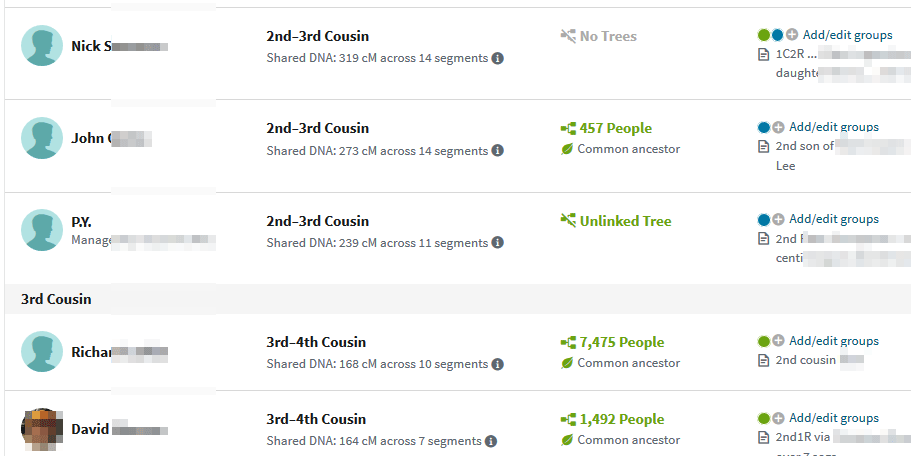
Notice that most have either a green or blue dot, the first one has both because he is a 1st cousin once removed so shares 2 great grandparent lines (dots = groups)

At Ancestry click on the + next to a match to assign it to a group with the color you choose

Start by creating a group for each great grandparent's line. I like to use warm colors for the maternal side and bluish colors for the paternal










Each color stands for a great grandparent line except on the Bavarian side where there are no testers
You need a good family tree for this!
Ancestry has done a lot of the work for you by searching trees for common ancestors
Clicking Common ancestors will display only those matches with shared ancestors found via any tree on Ancestry
SInce I always add a note showing how I am related I can quickly look through the matches to see if there are any new ones

But typically when you log in you want to see your new matches, if you catch them early they are more likely to respond to your messages


Personally I used to look at just 4th cousins or better who were unviewed and recent but then Ancestry added a centimorgan filter!



Click a match name or tree and see how you are related
Clicking on a "Common Ancestor" brings up a display like this showing the relationship pathways


Next go back to the match page and click shared matches, give them all a dot for this family line (Munsons are green)!
Shared matches only go out to 4th cousins (20cM)








One problem with that is that a second cousin shares BOTH great grandparents so more distant shared matches might be HALLING not MUNSON

Another approach is to look for the descendants of a specific ancestor via ThruLines on your DNA home page



Unlike the Shared Matches feature, ThruLines finds even distant cousins
put your cursor on an ancestor on this page and see how many DNA descendants are here
So to check for Halling side matches look at Josephine's parents on the ThruLines page ... More matches than to her! So 6 Halling matches
Click on Peder

The ThruLines display for Peder Halling
click on any down arrow to see more
(note that my brother has more Halling matches than I do!)

Click on the EVALUATE to see where the information is from the right column will slide in to show tree information


Ancestry explains why it thinks Anders is the son of Johanne and lists the family trees it used to determine that

But how do I copy this information to my tree?

Click on EVALUATE then click the tree name in one of the lists, more records is better!

When you click on the family tree name in the EVALUATE panel
up comes the information about this person in the same box -
every name in blue is clickable
click on the person to copy

Click on Tools then the + Save to Tree
(actually it's better to go to the parent who is already in your tree to Save


Save to tree brings up a box, start typing, it looks in your tree for that person
Click the name it finds and the box gets a Save button


Scroll down the page and see all the family members. Just like when you click a green leaf.
Any facts can be clicked over to your tree

Add a tree tag showing this is a DNA Connection

To add more information about Inga, go back to the tree we copied from
To add a tag to a person click on the plus and tag


Click on her name to go to her profile in the other tree
then you can use Save to Tree as before

Sometimes Ancestry can figure out the relationship from just the parents of your match!


One last tip: Click on your match's name on their match page to get to their profile and see whether they have logged in recently



MyHeritage also finds the relationships using many trees
called the Theory of Family Relativity
You can select just the matches with "theories"
click on Filters then All tree details then click Has Theory ...
MyHeritage matches are presented on card like boxes with much information
Melissa is a cousin I found at MyHeritage



Here is the MyHeritage theory, it only uses our two trees but many theories use multiple trees


An example of using multiple trees
As on Ancestry, to copy information over start with the person who is in your tree


Look at the profile in your tree first


If the match looks good then use Smart Matches to find the other tree
When you find the smart match click Review Match

Look carefully and if it is a match click Confirm Match



Click the < to copy a new fact over


A large selection of her relatives can be copied over as well
Not just new facts but different ones or "improved" ones can be copied

Don't forget to click save when you are done!
23andme does not have trees but it connects to FamilySearch, a Beta feature, one you have to set up

23andme has an exciting new feature, it predicts a tree from your matches


A "Beta" feature it is accurate for close family
You can add names in here also
Looking more closely, it predicts people who are descended from his grandparents and also from a set of great grandparents
Clicking an individual brings up a box where you can go to their profile or message them


This is really just an advanced form of clustering, the most exciting recent tool for DNA

Clustering can be a quick shortcut to finding the common ancestors with a cousin. The idea is to display your matches who match each other in an easy to understand visual format
You can sign up to cluster at GeneticAffairs.com or you can use the clustering tools from DNAgedcom.com or GEDmatch or MyHeritage or DNA2tree

The result might look like this, each colored box is expected to consist of matches descended from one set of your great grandparents
On some versions of clustering, all the names are clickable to the match (others have a list below)
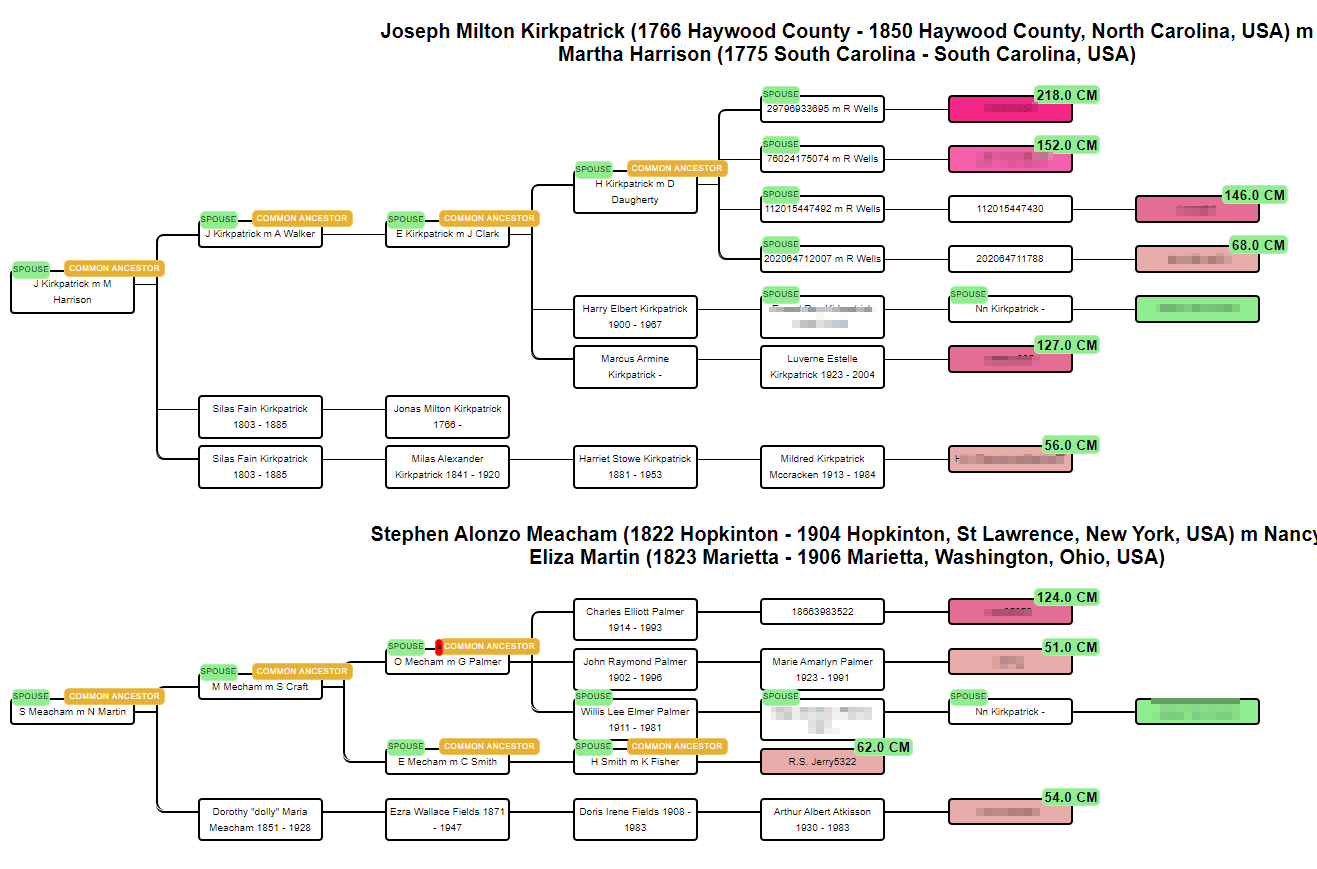
Recently, Genetic Affairs has added a tree building feature. These are the trees it made for the top 2 boxes in the previous picture
Jack
Jack
Even more recently, Genetic Affairs has added the ability to cluster a specific Ancestry group or all but a specific group
You need to find your group number which is in the URL at Ancestry when you ask to view a specific group, e.g.
https://www.ancestry.com/discoveryui-matches/match-list/fb644ed8-6c64-468c-b857-1e5259ab83c0?customgroupids=1005

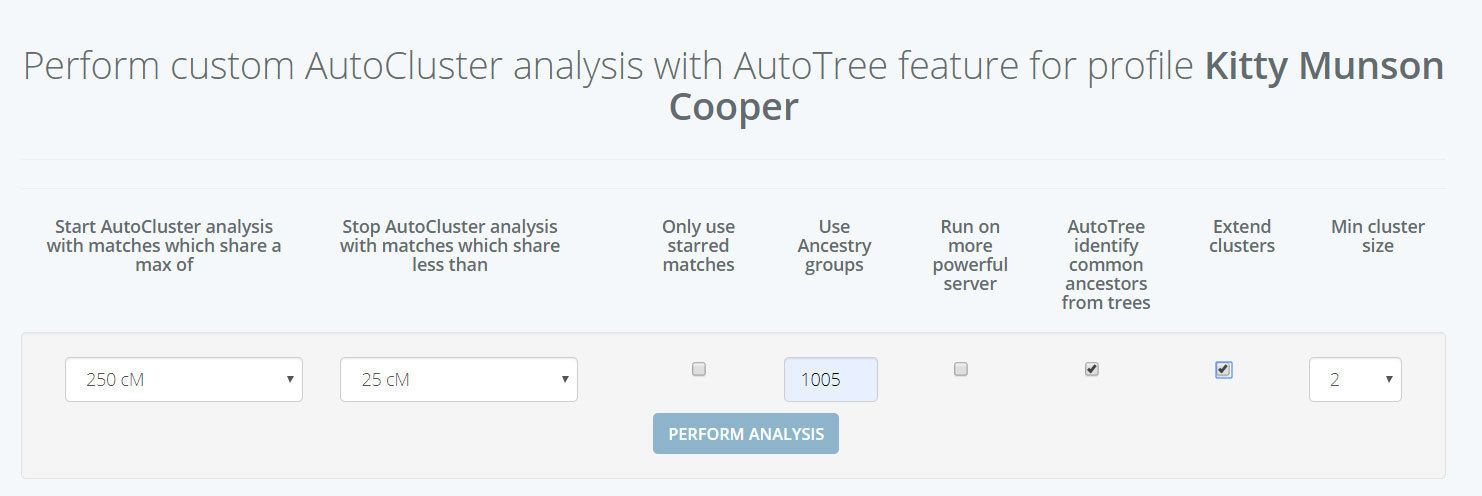
GEDmatch.com shows the matches that triangulate when you use their Tier 1 cluster tool also which ones have trees

Text
To create that clustering graph I used select all on the first page of my match list and then clicked on Visualization Options


Within the Visualization Options, I clicked on clustering and selected the parameters shown below
Then I waited ....
MyHeritage includes a cluster tool from Genetic Affairs






Remember Melissa? Her cluster must also be Munsons
In the lists of people for each cluster your notes are included and everything is clickable
DNA2tree is only on iPhones and iPads via a paid subscription but it is a real game changer for unknown parentage searches

It automates finding common ancestors at Ancestry and can even build their tree

